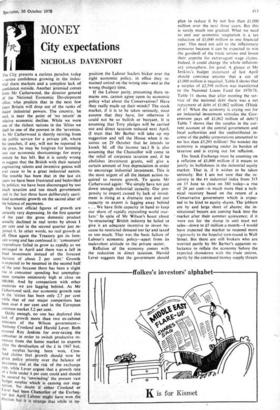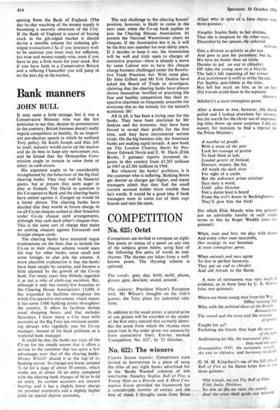MONEY City expectations
NICHOLAS DAVENPORT
The City presents a curious paradox today —serene confidence growing in the indus- trial share markets and a complete lack of confidence outside. Another jeremiad coma from Mr Catherwood, the director general of the National Economic Development office, who predicts that in the next few years Britain will drop out of the ranks of major industrial powers. The country, he said, is near the point of `no return' in relative economic decline. While we were one of the richest nations in the 'fifties we shall be one of the poorest in the 'seventies. As Mr Catherwood is shortly retiring from the public service for a private job, where his speeches, if any, will not be reported in the press, he may be forgiven for lamming into our economic shortcomings for every minute he has left. But it is surely wrong to suggest that the British with their natural engineering talents and invefftive genius will ever cease to be a great industrial nation. The trouble has been that in the last six years we have been frustrated and bedevilled by politics; we have been discouraged by too much taxation and too much government and in the last three have deliberately sacri- ficed economic growth on the sacred altar of the balance of payments.
The latest official figures of growth are certainly very depressing. In the first quarter of the year the gross domestic product actually declined in real terms by about 1 per cent and in the second quarter, just re- gained it. In other words, no real growth at all. Once again the Treasury got its fore- cast wrong and has confessed it: 'consumers' expenditure failed to grow as rapidly as we envisaged in April and there was a fall in fixed investment instead of the forecast increase of about 2 per cent.' Growth is expected to be resumed in the second half of the year because there has been a slight rise in consumer spending but unemploy- ment remains ominously high at close on 600,000. And by comparison with other countries we are lagging behind. As Mr Catherwood said, our economic growth rate in the 'sixties has been only 2.7 per cent While that of our major competitors has been over 4 per cent and in the European common market 5.2 per cent. Oddly enough, no one has deplored this lack of growth more than two ex-cabinet ministers of the Wilson government— Anthony Crosland and Harold Lever. Both excused Roy Jenkins for over-taxing the consumer in order to switch productive re- sources from the home market to exports after the devaluation of the £ in 1967 but, the surplus having been won, Cros- land claims that growth should now be given policy priority over the balance of Payments and at the risk of the exchange rate, while Lever argues that a growth rate of a little under 4 per cent could and should 11)7.e secured by 'unwinding' the present vast udget surplus which is causing our stag- nation. No doubt if either Crosland or Lever had been Chancellor of the Excheq- tiler last April Labour might have won the e ection but it is strange that while in op-
position the Labour leaders bicker over the right economic policy, in office they re- mained united on the wrong one—and at the wrong (budget) time.
If the Labour party, presuming there re- mains one, cannot agree upon its economic policy what about the Conservatives? Have they really made up their minds? The stock market, if it is to be taken seriously, must assume that they have, for otherwise it could not be so bullish or buoyant. It is assuming that Tory pledges will be carried out and direct taxation reduced next April.
trt.}it that Mr Bather will take up my suggestion and tell the House when it re- sumes on 29 October that he intends to knock 9d. off the income tax.) It is also assuming that the Chancellor will come to the relief of corporate taxation and, if he abolishes investment grants, will give a certain amount of free depreciation in order to encourage industrial investment. This is the most urgent of all the instant action re- quired to restore growth. To quote Mr Catherwood again: 'We simply have not put down enough industrial capacity. Our pro- pensity to import caused by lack of invest- ment is rising at a dramatic rate and our capacity to export is lagging away behind p . . We have little capacity in hand to keep our share of rapidly expanding world mar- kets.' In -spite of Mr Wilson's boast about 're-structuring' British industry he failed to give it an adequate incentive to invest be- cause he restricted demand too far and taxed us too much. That was the basic failure of Labour's economic policy—apart from its malevolent attitude to the private sector.
Reflation of the economy comes with the reduction in direct taxation. Harold Lever suggests that the government should
plan to reduce it by not less than £1,000 million over the next three years. But this is surely much too gradual. What we need to end our economic stagnation is a tax reduction of £1,000 million in one financial year. This need not add to the inflationary pressures because it can be expected to win the goodwill of the trade unions and lessen their appetite for extravagant wage claims. Indeed, it could change the whole inflation- ary atmosphere, for good. A glance at Mr Jenkins's budget statement of last April should convince anyone that a cut of £1,000 million is required. Table 8 shows that a surplus of £2,598 million was transferred to the National Loans Fund for 1970-71. Table 11 shows that after meeting the ser- vice of the national debt there was a net repayment of debt of £1,062 million. (Think of it! When the economy is crying out for an industrial investment stimulus the (bov- ernment pays off £1,062 million of debt!) Table 7 shows that the surplus in the cur- rent account of the central government and local authorities and the undistributed in- come of the public corporations amounted to no less than £5,293 million! No wonder the economy is stagnating under its burden of taxation and is crying out for reflation.
The Stock Exchange must be counting on a reflation of £1,000 million if it means to justify its bullishness in the industrial equity market. That is, if it wishes to be taken seriously. But I am not sure that the re- covery in the Fr industrial index from 315 on 15 June to close on 380 today—a rise of 20 per cent—is much more than a tech- nical recovery based on the return of a Conservative government which is expec- ted to be kind to equity shares. The jobbers are by and large short of .shares: the' in- stitutional buyers are coming back into the market after their summer quiescence; if it were not for the slump in unit trust net sales—down to £5 million a month—I would have expected the market to respond more vigorously to the hopeful turn-round in Wall Street. But there are still brokers who are worried partly by Mr Barber's apparent re- luctance to relate the economy before the expected showdown with the trade unions, partly by the continued money supply threats
ffolkes's investors' alphabet
K is for Kismet coming from the Bank of England. (The day-by-day watching of the money supply is becoming a neurotic obsession of the City. If the Bank of England is scared of buying stock in the gilt-edged market it should devise a sensible scheme for isolating gilt- edged transactions.) So if you investors wish to be cautious you must wait for reflation, tax-wise and money-supply-wise, even if you have to pay a little more for your stock. But if you have faith in a Conservative Britain and a reflating Chancellor you will jump in on the next dip in the market,







































 Previous page
Previous page